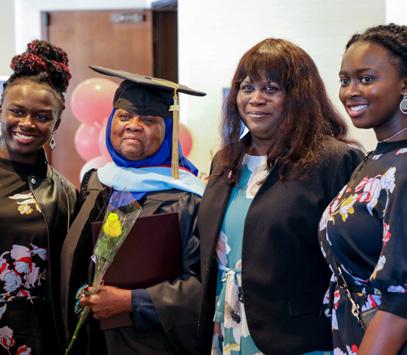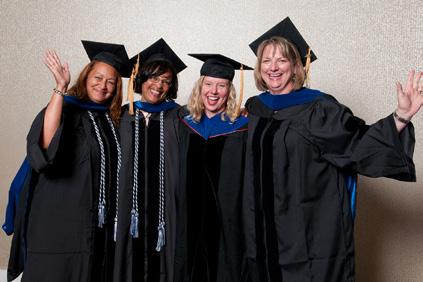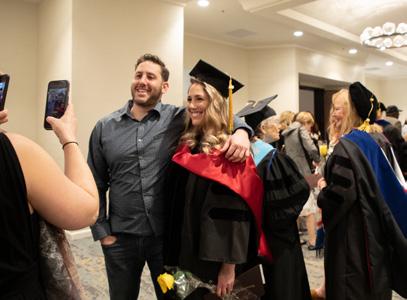FOCUS
for students | faculty | alumni | staff | trustees | and friends of fielding



































































































President
Katrina S. Rogers, PhD
Managing Editor
Kaylin R. Staten, APR, MPRCA
Editor
Carol Warner
Art Director
Rob Grayson, Boone Graphics
Graphic Design
Studio B at Boone Graphics
FOCUS is published by
Fielding Graduate University 2020 De la Vina Street
Santa Barbara, CA 93105
FIELDING.EDU
Please send reader responses to communications@fielding.edu
About the Cover: This is commemorative issue 2 of 2. As Fielding commemorates its 50th Anniversary, we reflect on the scholarship, practice, and impacts of our community. At our core, our storied history imbues our founders' and university’s values and mission to pave the way for a more just, sustainable world. © 2024 Fielding Graduate University. All rights reserved. No portion of this publication may be reproduced in any form without prior written permission from Fielding Graduate University.
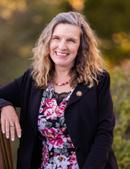




REVISITING THE FOUNDERS' VISION THROUGH THE LENS OF A PASSION FOR ADULT LEARNING

ONE OF FIELDING'S INAUGURAL CLASS GRADUATES REFLECTS ON HER FIELDING EXPERIENCE
TRANSFORMATIVE POWER OF LEARNING SHOWCASES 50 YEARS OF LIFELONG LEARNING AT FIELDING






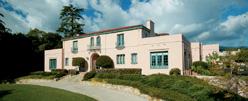
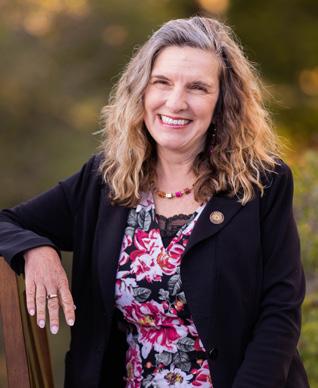
Fielding celebrates the 50th Anniversary of our founding in 2024 and 2025. Anniversaries are rituals that include joy and reflection. Reflection can often lead to insight into current conditions that offer a way forward into our future. Amidst the tumultuous changes of the late 20th century and into the 21st, one of the enduring elements of Fielding is our collective contributions to knowledge.
In recent months, A.I. has become more ubiquitous and explicit in appearing in our daily lives, such as with offers to download a free A.I. “benevolent assist” (Google books) to help with advancing the main ideas in one of their publications, and the launch of ChatGPT that does everything from analyzing data to writing poetry. Both are slightly alarming in the use of A.I. to do some of our thinking for us. Scholars, like many other professionals, are wary of the possibilities of the influence of A.I. on original research, most often expressed as a call for broad participation in dialogue that sets ethical standards for the use of such technologies.
The increasing use of A.I. by the public has also given rise to recent stories across print, online, TV networks, and streaming services that reveal the level of both excitement and anxiety about a technology that has been created to think. There are boosters of A.I. who argue that like many new technologies, it can be a liberating force for good and contribute to democratization and the spread of information and knowledge. Equally, there are those who predict that A.I. will cause our extinction.
In his writings, the French-Algerian philosopher Jacques Derrida argues that all technologies are inevitably entwined in our being — that is the way we move through the world. They are not tools, but rather entangled with us. It was prescient of Derrida, writing decades ago, because he imagined a future which ties our actions, behavior, and social conditions to the ways in which A.I. is now in our lives. Historians of science and technology have long written about the difficulties of accurately judging technology, such as Winner in 1980, not just for their contributions to efficiency and productivity but also for the ways that they can embody specific forms of power and authority (Winner,
1980). More recently, in Weapons of Math Destruction, Cathy O’Neil demonstrates how the use of algorithms is narrowing social choices irrespective of moral imperatives.
Coupled with these technological developments, there are post-pandemic stressors in societies across the world. Pandemics have been a part of the human story since the beginning. Over the course of written history, scholars have noted that the second-order effects are much the same, manifesting in an increase in war, violence, xenophobia, racism, as well as inflation and economic uncertainty. Furthermore, a recent APA study revealed that the long-term stress engendered by the COVID-19 pandemic is having a significant impact on well-being of people living in the US. The subtitle of their report, “A Nation Recovering from Collective Trauma” is a telling way to frame what is needed from those of us who study the social sciences.
Part of being a scholar is to be able to both participate in our communities and simultaneously observe the forces that influence us and others. I think of this as our distinctive mission as active practitioners; we know that the application of research is always in a context of change, and that knowledge is best informed by the practical questions that are derived from our society. What is happening around us is fraught and may seem particularly chaotic, but I suggest that it has been ever thus, that as people of our own time, we do not have enough perspective to know what the future holds. What we do have, though, are the scholarly tools of critical reasoning, analysis, and discernment to help us and others make sense of the patterns of human behavior.
As you read this issue, I invite you to think about your role in moving a scholarly conversation forward in your own work and practice. What inspires you? What challenges you? As Fielding community members, we can deploy our scholarly capabilities in service of these questions.
Wishing you a peaceful season wherever you are and I look forward to seeing many of you virtually or in person as we move through the rest of the year.
With warm regards,
Katrina S. Rogers, PhD President
Gary Wagenheim, PhD, Board Chair
Adjunct Professor, Beedie School of Business Simon Fraser University Vancouver, BC, Canada
Karin Bunnell, PhD, Vice Chair
Organizational Development Consultant Pleasanton, CA, United States
Jay Harding, PhD, Treasurer Business Architect
State of Wisconsin Investment Board Libertyville, IL
Patricia Zell, JD, Secretary Partner, Zell & Cox Law
Santa Barbara, CA, United States
Michael Ali, PhD
Chief Digital and Information Officer
Omega Engineering
Norwalk, CT, United States
John Bennett, PhD Professor, Queens University of Charlotte Charlotte, NC, United States
Karen S. Bogart, PhD President, Smith Bogart Consulting Santa Barbara, CA, United States
Keith Earley, PhD, JD Principal, Earley Interventions, LLC Rockville, MD, United States
Zabrina Epps, PhD
Leadership Coach & Advisor, Epps Foresight Advisory, LLC.
Emerging Fellow, Association of Professional Futurists Fellow, Institute for Social Innovation Laurel, MD, United States
Tracy Fisher, PhD
Director, Center for Social Justice & Civil Liberties Riverside, CA, United States
Michael B. Goldstein, JD
Managing Director Center for Higher Education Transformation Tyton Partners
Washington, D.C., United States
Anthony Greene, PhD Faculty Trustee Gainesville, FL, United States
Lenneal Henderson, PhD Faculty Trustee Claremont, VA, United States
Linda Honold, PhD
President, Vision in Action Milwaukee, WI, United States
Judith Katz, EdD
Executive Vice President Emeritus The Kaleel Jamison Consulting Group Washington, D.C., United States
Christie Prairie Chicken, PhD
SIYO Circle
Anchorage, AK, United States
Katrina S. Rogers, PhD, ex officio President, Fielding Graduate University Santa Barbara, CA, United States
María Viola Sánchez, PhD Institute for Social Innovation Fellow Westlake Village, CA, United States
Connie Shafran, PhD
Clinical Psychologist Malibu, CA, United States
Nicola Smith, JD
Faculty Trustee
Berkeley, CA, United States
Ivory A. Toldson, PhD Director, Education Innovation and Research at the NAACP
Washington, D.C., United States
Natasha Miller Zahn
Vice President of Finance
Santa Barbara Symphony
Santa Barbara, CA, United States
Trustee Emerit
Nancy Baker, PhD
Karin Bunnell, PhD
Michael Goldstein, JD
Russ Goodman, MBA
Bo Gyllenpalm, PhD
Linda Honold, PhD
Otto Lee, EdD
E. Nancy Markle
Fred Phillips, PsyD*
Margarita Rosenthal, PhD*
Connie Shafran, PhD
Nancy Shapiro, PhD
*deceased
SEVERAL CELEBRATIONS ARE UNDERWAY AS FIELDING CONTINUES TO COMMEMORATE 50 YEARS.
HERE IS A SELECTION OF OUR EVENTS SO FAR IN 2024.
On Jan. 7, the Fielding community launched the 50th Anniversary celebration year with a fundraising event in memory of Don Bushnell, PhD, a founding faculty member of the Human and Organizational Development program. Jan. 7 was Don's birthday, a day he often used to raise funds for the named scholarship at Fielding. Although Don passed away on June 19, 2023, his legacy continues to inspire us. This year, we hosted an online fundraiser featuring Dr. Bushnell's unique collection of fish wind chimes, with all proceeds benefiting the Bushnell Endowed Scholarship for Organizational Social Change. We are proud to announce that we raised $10,000 for the scholarship.
Fielding hosted a film premiere for “The Voices of Fielding,” an exclusive cinematic journey into the heart of education, on Jan. 14 in Santa Barbara. After the screening, the film’s director, Jean-Pierre Isbouts, DLitt, and President Katrina S. Rogers, PhD, discussed the importance of the film.
“The Voices of Fielding” highlights graduates from the Navajo Nation, representatives from the Black Student Association, and a broad cross-section of students and alums from all schools at Fielding. It features local Santa Barbara leaders and alums, including U.S. Representative Salud Carbajal and California State University Channel Islands President Richard Yao, PhD.
The full video is available at fielding.edu/YouTube.
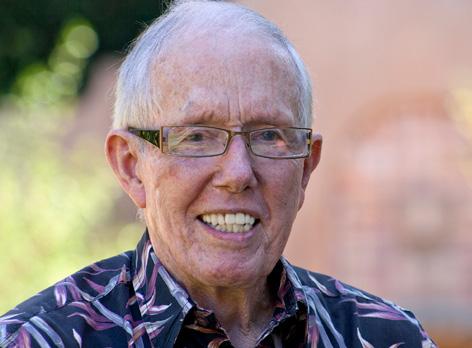
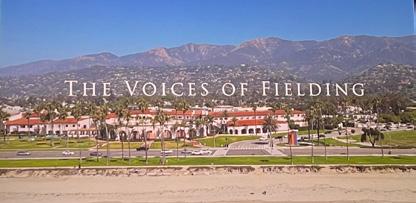

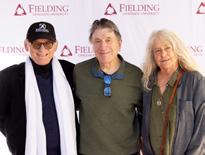
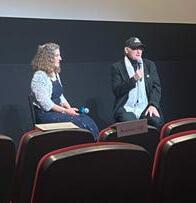
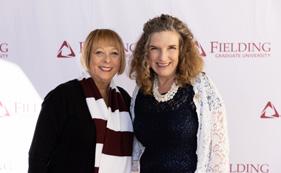
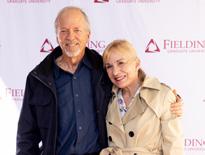
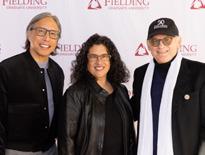
Fielding University Press hosted an hour-long virtual book launch for The Transformative Power of Learning on April 10. It showcased Fielding’s 50th Anniversary and chapter authors’ work with discussions led by editors Elena I. Nicklasson, MA, and Jean-Pierre Isbouts, DLitt. Participaing authors included Drs. Tracy Gibbons, Zieva Konvisser, Sergej van Middendorp, Tahlia Bragg, and Carrie Arnold. Watch the recording at fielding.edu/YouTube.
On May 1, President Katrina S. Rogers, PhD, hosted a delegation from Keystone Group (Shanghai), Inc. at the historic Cosmos Club in Washington, D.C. The delegation was led by Fielding alum and Keystone’s Board Chair Emeritus Marjorie Woo, PhD, Board Chair Amanda Shang, and Board Member Yin Tian Ran, PhD. Together, they signed a memorandum of understanding to affirm their ongoing partnership.
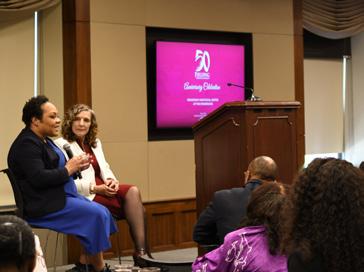

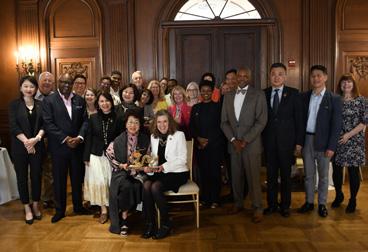
On May 2, Fielding hosted “Democracy and Social Justice at the Crossroads” on Capitol Hill in Washington, D.C. The event featured keynote speaker Yamiche Alcindor, Washington Correspondent for NBC News. In addition, our community reflected on some of the most pressing issues of our time while commemorating our anniversary year. The event also featured the unveiling of the Dr. Orlando L. Taylor Excellence in Scholarship Award. The Fielding community also gathered at an afterglow event at the Capitol Hill Hotel after the event. D.C. Mayor Muriel Bowser also declared May 2 as a Day of Remembrance for Dr. Orlando L. Taylor.
On March 11, Fielding commemorated its 50th Anniversary and Marie Fielder’s birthday with the annual Call Across the Globe and our Giving Marathon. While scholarship and practice are cornerstones of the Fielding experience, stories and relationships are also an essential part of Fielding’s fabric. Attendees heard stories from several individuals and shared their own narratives in breakout rooms with faculty emeriti. Speakers included Tesa Leon, MS, MA, MEd, a current Leadership for Change doctoral student, and Maria Ritter, PhD, Clinical Psychology ('81) alum. Attendees also talked with the following faculty emeriti in breakout rooms: Anna DiStefano, PhD; Lynn Luckow, PhD; Marcella BensonQuaziena, PhD; David Rehorick, PhD; and Jean-Pierre Isbouts, DLitt. The recording is available at fielding.edu/YouTube.


1 9 3 62 0 2 4
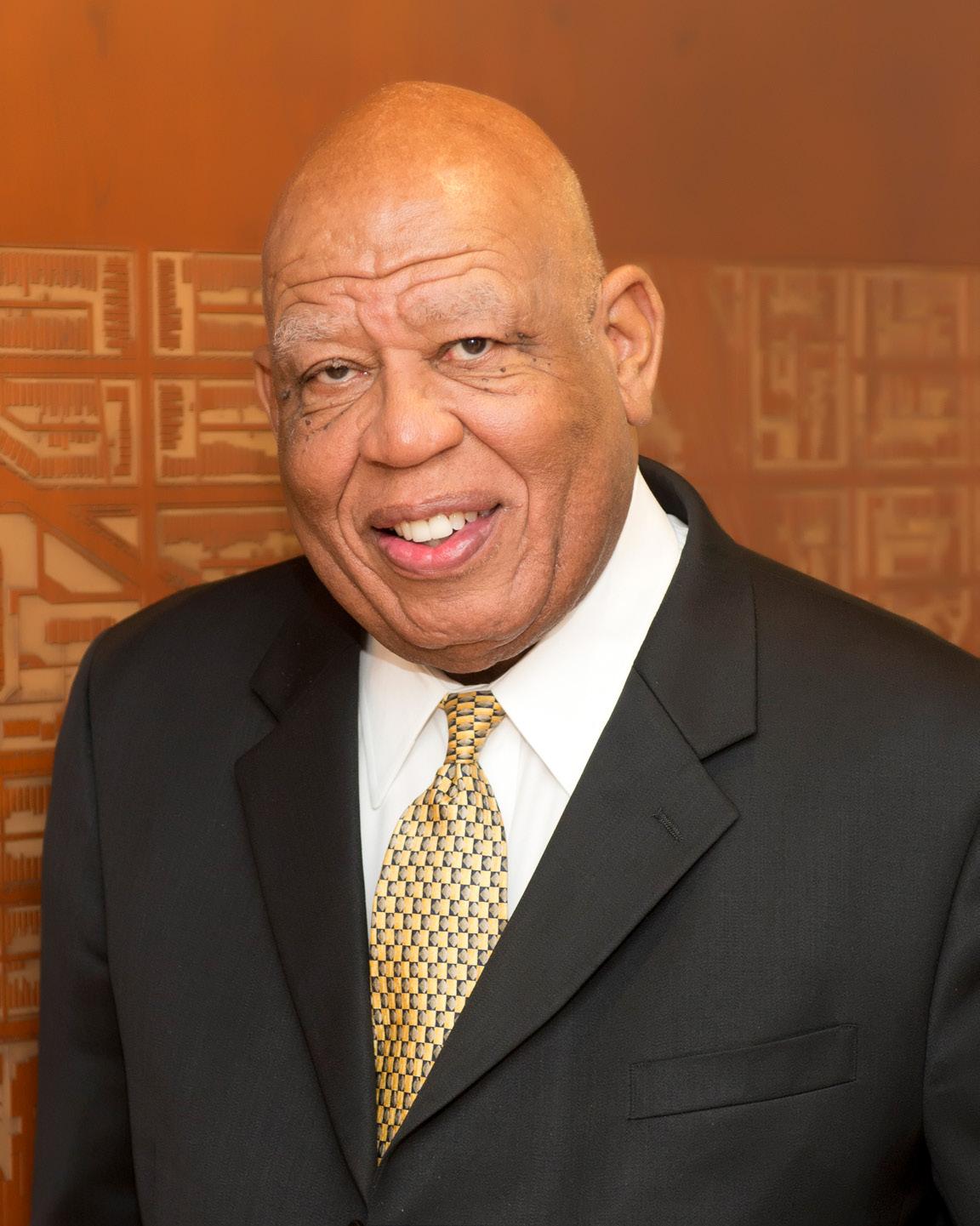
We remember and honor Dr. Taylor’s contributions to Fielding Graduate University, higher education, and social justice on an international scale. His remarkable contributions left an indelible mark on our community, and his loss is deeply felt. Thank you, Dr. Taylor, for being a champion and for leading the way.

1974:
The Fielding Institute is founded by Frederic Hudson, Hallock Hoffman, and Renata Tesch. The Articles of Incorporation are signed at the home of the founding Board of Trustees member and future Educational Leadership for Change faculty, Dr. Marie Fielder.
The first Fielding graduates earn a Doctor of Education degree.
1977:
More than 100 students, faculty, and staff attend Psychology Summer Session at La Casa de Maria in the hills above Santa Barbara for first final oral review and Psychology graduation.
2005:
Fielding Graduate Institute renamed Fielding Graduate University.
1978:
Human Development program is founded by Dr. Don Bushnell with MA, DHS, & EdD/PhDs.
2022:
2006:
Certificate in Evidence-Based Coaching launches in response to demand that coaching become more grounded in theory and research.
1982: Western Association of Schools & Colleges (WASC) accredits Fielding in June.
2013: Katrina Rogers, PhD, named president in November and continues to be Fielding’s longest-serving president.
2014: Fielding acquires doctoral program in Infant and Early Childhood Development with emphasis in developmental disorders.
EBC program recognized as having met the Graduate School Alliance for Education in Coaching (GSAEC)’s Academic Standards for Graduate-Level Educational Programs and Level 2 Accreditation from the International Coaching Federation (ICF).
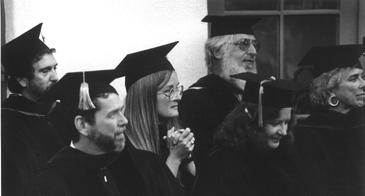
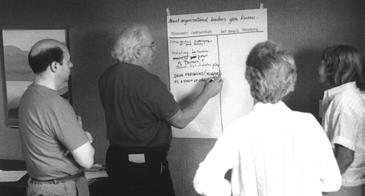
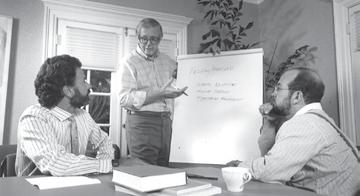

2001:
1996: A new School of Education is established.
2000: Alonso Center for Psychodynamic Studies is established.
2015: Marie Fielder Center for Democracy, Leadership, & Education founded.
First students from partnership with Navajo Nation graduate from Educational Leadership & Change.
Fielding Institute renamed Fielding Graduate Institute in July.
2003:
First students enrolled in PhD in Media Psychology, the first of its kind.
2016: Fielding University Press launches to publish books by faculty and alums.
2002: Fielding’s Institute for Social Innovation (ISI) is founded.
2019:
The Black Student Association, formerly the African American Student Association, is founded .
Fielding’s Alumni Network becomes Fielding’s Alumni Association.
2023:
The President’s Global Ecological and Social Justice Service Year declares 2023 as Global Social/Ecological Justice Service Year. The American Psychological Association reaccredits Fielding’s Clinical Psychology program for 10 years.
WASC approves the affiliation between Fielding and Rowan Education Partners.
2021: Fielding’s Board of Trustees unanimously approves an affiliation with Rowan Education Partners, an initiative of Rowan University.
SCAN TO VIEW THE ENTIRE TIMELINE
The following is an excerpt from longtime HOD faculty member Keith Melville, PhD’s A Passion for Adult Learning, published by Fielding University Press in 2016. This publication was funded by Dr. Charles McClintock and Carol Wilburn and is a chronicle of Fielding’s history is outlined in several themes. These include stories of people and personalities, the ebbs and flows of an upstart program, alternative pedagogical experiments, progressive traditions, and more.
Fielding was a pioneer in important respects, and not just in the sense that it was one of the first graduate programs to recognize the potential of the internet and employ it as an integral part of its learning model. The founders anticipated and appreciated the importance of a handful of significant developments:
• They anticipated that higher education, which has traditionally been geared to young adults in their 20s, needs to be re-designed – part of it, at least – to respond to the influx of adult, mid-career learners, who have different needs and bring a different set of experiences to their graduate education.
• Recognizing that many mid-career adults who pursue a PhD are not able to interrupt their lives to attend residential campus-based programs, they anticipated the need for distributed learning, a model now called “lowresidency” programs.
• At a time when the cost of higher education was starting to increase rapidly, they recognized how important it is to pare down the amenities and accoutrements offered in campus-based programs to keep costs down and make doctoral education accessible to a broad group of students. What happened over the next few decades showed how prescient they were. Over the next 30 years the cost of tuition at public and private colleges more

than doubled in inflation-adjusted dollars, which led to the current crisis of affordability and staggeringly high levels of student loan debt.
• Fielding’s founders saw that a higher education system based on course credit or “seat time” is a misleading and inaccurate way to assess what students know and what they have learned. From the beginning, Fielding’s model was assessment-based, which anticipated for several decades the national movement toward outcome-based learning.
• They anticipated that doctoral programs, which have traditionally been devoted to the task of preparing graduates for academic careers, do not respond to the needs of a growing number of students who seek a graduate education which they intend to apply in other ways, as practitioners in a wide variety of fields. As illustrated by the HOD (Human and Organization Development) program, one of Fielding’s hallmarks has been its scholar-practitioner orientation.
• They recognized that most graduate programs, which are intended to prepare students for academic careers in specific academic disciplines and focus their curricula on discipline-specific knowledge, are not well suited to the needs of many people entering graduate programs. For this reason, Fielding’s HOD program was among the early inter-disciplinary PhD programs.

• They recognized that learning – especially at the doctoral level – is not likely to be effective if it is facultycentered, featuring professors as sage-on-the-stage experts. Learning is more effective when it is based on agreements that are mutually developed by faculty and students. The shift from faculty-centered learning to student-centered learning signals a fundamental departure from the way higher education has been organized over the past century.
• Finally, the founders recognized that one of the chief weaknesses of mainstream doctoral programs is that they focus almost entirely on scholarly knowledge and concepts. What has been neglected is competency development, or what a well-educated person should be able to do. These include fundamental scholarly competencies such as research skills, and the ability to make critical assessments of knowledge claims, which transcend specific disciplines. As Fielding’s co-founder and first president Frederic Hudson noted on various occasions, the evaluation matrix for doctoral learning should include the ability to demonstrate high levels of professional competence in applied settings, as well as what he called “developmental knowledge of oneself and others,” by which he meant the ability to demonstrate
“emotional skills, decisional skills, and communication skills,” among others. Fielding’s founders envisioned a doctoral experience that enhances various aspects of a student’s development, not just their scholarly knowledge, an orientation referred to as “whole-person education.”
The term “visionary” is often used, sometimes quite loosely. In the case of Fielding’s founders, it is accurate and well-deserved. They identified major trends and imagined the future of higher education several decades before these trends were widely recognized, and they asked fundamental questions: What is higher education’s purpose? How do people learn best? What kind of learning environment is best suited to adults as they re-tool for the third and fourth quarters of their lives? Does it make sense to organize higher education according to academic disciplines? Far from being captive to traditional ideas about how doctoral students should be educated, Fielding’s founders put forward a bold new approach to graduate studies.
Learn more about and purchase A Passion for Adult Learning at amazon.com.
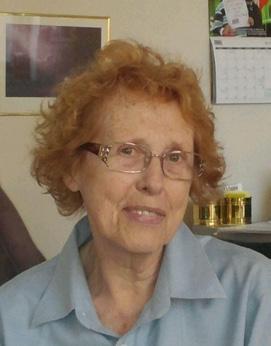
August 3, 1974 was a day of firsts.
Centered at 777 Camino Pescadero, in Goleta, California, Fielding’s founders and initial core faculty conferred the first set of degrees to graduates during Fielding’s inaugural year as an institution. Eighteen graduates commemorated a longsought-after achievement: earning a doctoral degree as an adult learner.
It was the beginning of the next stage of their professional and personal lives. It was also the first step in Fielding’s illustrious history that now spans a half century.
This day also marked a special occasion for Jackie Meyers, PhD, then known as Jackie McGoff, who was one of the graduates who took the stage that day. Throughout the past 50 years, she has grown from a community college professor and Fielding graduate to an accomplished psychotherapist with her own practice and a tenured University of Pittsburgh professor. Since 1985, she has primarily worked with adults and family members experiencing challenges in mental health, sexual addictions, chemical dependency, and disorders centered on financial, LGBTQIA+, and other issues.
While she retired from teaching two years ago, she still practices psychotherapy in Pittsburgh with a select roster of clients. Dr. Meyers credits Fielding with igniting her scholarship and continued practice.
Dr. Meyers has fond memories of her time at Fielding – a bygone era that has since changed with the ebbs and flows of passing decades. Dr. Meyers served as class president and president of the first alumni association.
“I wasn’t interested in any doctoral programs around here in Pittsburgh,” Dr. Meyers said. “And then, I learned about
Fielding, which was then the Fielding Institute. I was in Santa Barbara for two summers and then had an external degree professor here in Pittsburgh who helped me with my dissertation. I took courses both in Santa Barbara and Pittsburgh. I worked with Dr. Charles Brydon (Education Core Faculty), and it was just all a very positive experience. We had a lot of social gatherings, and it was always very intellectual. We talked about concepts and psychology and had stimulating conversations.”
She centered her dissertation on “The Effect of Being a Peer Tutor and Peer Tutee Upon Achievement.” She used her dissertation work in the classroom for almost 52 years until she retired from her faculty role two years ago.
Dr. Meyers also had a hand in selecting the first cap and gown, commencement speaker, and other core details. She even racked up more than $100 in long-distance phone fees while trying to recruit students for Fielding.
“I remember flying to Santa Barbara,” Dr. Meyers said. “There was going to be a graduation, and nothing was organized. I was used to leadership in my role as a department chair at a community college. Where I taught, there were 15 psychologists and sociologists, so I used Robert’s Rules of Order frequently. So, I used them there, too. Everybody said, ‘OK, well, you can be president of the class.’ Robert’s Rules and my expertise led me to those first decisions for Fielding.”
Dr. Meyers still has a deep connection to Fielding, no matter how many years pass.
“Whenever I was teaching, I often referred to Fielding,” she said. “Now, in my office, I have Fielding brochures. People will ask me about my credentials, and I will brag and say that I went to Fielding. My Fielding experience certainly changed my life.”
The Fielding University Press publication, The Transformative Power of Learning, encapsulates the essence of lifelong learning and its transformative power.
This compelling publication, curated by editors Elena I. Nicklasson, MA, and Jean-Pierre Isbouts, DLitt, is a testament to the enduring impact of Fielding Graduate University's innovative approach to adult education and its pivotal role in shaping transformative learning experiences.
Marking half a century of educational innovation, The Transformative Power of Learning is not just a retrospective account but a forward-looking exploration of the role of education in personal and societal evolution. This work invites readers into the heart of Fielding's philosophy, where individual stories of growth and discovery illuminate the broader narrative of transformative education's impact on lives and communities.
The monograph offers a rich tapestry of narratives that reflect the diverse and profound journeys of Fielding's alums, faculty, and students. It encompasses a range of perspectives, from the transformational experiences of U.S. Representative Salud Carbajal to the groundbreaking research of Karen S. Bogart, PhD, former chair of Fielding's Board of Trustees.
This monograph is a gateway to understanding the rich and varied paths of transformation that define excellence in higher education, offering inspiration and insight to all who value the power of education to change lives.
The Transformative Power of Learning is now available on Amazon and other online retailers. Fielding students, faculty, staff, alums, and trustees can access a copy via the Dr. Dianne Kipnes Library.
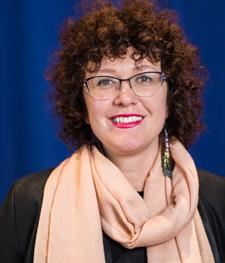
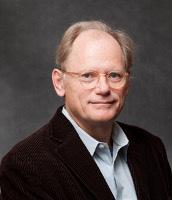

Fielding continues to move its diversity, equity, and inclusion work forward. Since 2021, Allison Davis White-Eyes, PhD, has collaborated with the Fielding community as VP of DEI to continue efforts across the university and beyond. The 20222025 JEDI Strategic Plan was established to focus on Path Forward Goals: Access and Success, Climate and Data, Teaching and Scholarship, Institutional Programming, Organizational Capacity, Nexus Partnerships, and Systems Change. This timeline showcases the work within the past three years.
INSTITUTIONALLY
• Equity Audit/Scorecard
• Reviewed Institutional Data
• Listening Sessions
• JEDI Strategic Plan
• DEI Website
• Diversity, Equity, Inclusion, & Access Certificate
• Standard Diversity Statement for all Syllabi and Position Descriptions
• Diversified Talent Capture PROGRAMMATICALLY
• DEI Critical Conversations/Flash Panels
• Coordinated Calendar
• Global Indigenous Peoples Acknowledgment
• Juneteenth/Indigenous Peoples Day/Veterans Day
• Pride Month
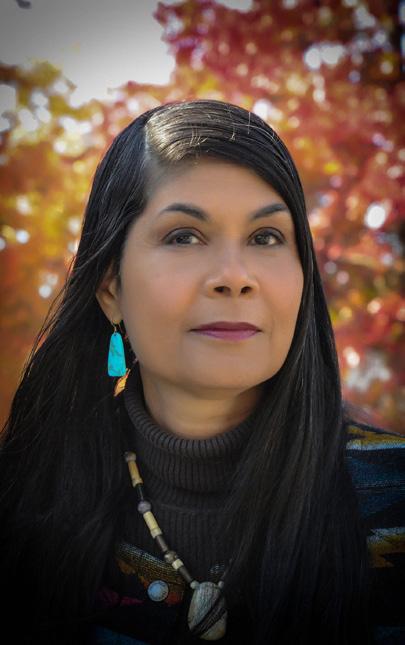
• Classification and Compensation Equity (HR)
• Search Advocate Program and Community of Practice (HR)
• Restorative Justice Team (AHRC)
• Data Capture (Office of Institutional Research)
• Diversity Communications (University Communications)
• Student Support:
– Fielding Connect (Shana Pote)
– 3 Practice Circle Dialogue Group (Daniel Kalvig and Christie Harrison)
– 2SLGBTQIA+ community
– International Students
– Black Student Association
– Veterans Student Group (Christina St. Clair)
• Associate Provost of Student Life and Thriving (Dr. Cherjanét Lenzy)
• Growth in Student Affinity Groups and Space
• Improved Data Capture in the Admissions Process
• Academic Strategic Plan with JEDI Integration (Dr. Konjit Page)
• Academic Policy Conversations
Mike Goldstein, JD
The 2024 State of Diversity Summit highlighted DEI efforts and included a conversation between Dr. Davis-White Eyes and Dr. Mike Goldstein, Fielding Trustee and Honorary Doctor of Human Letters. This interview snippet has been edited for length and clarity.
Allison Davis-White Eyes, PhD: As you are aware, we live in a time when there is increasing legislation and agitation against diversity, equity, and inclusion. We have situations, particularly in Texas and Florida, where DEI offices have been dismantled or are undergoing profound reorganization. In addition, there has been legislation presented to revise history and ban certain books, although there are some things that could use a reframe regarding DEI efforts. Why is this such a contentious issue in the United States, a pluralistic democracy, from your perspective, and what is motivating these moves? And where do you think we are headed? Is there something we should be mindful of here at Fielding?
Mike Goldstein, JD: It's extraordinarily important, particularly at this moment in history. And it's extremely important in terms of placing Fielding in its rightful spot in this pantheon of institutions that are concerned with this. We're hearing a great deal about higher education institutions failing to be thought leaders and failing to help direct the country on the right path. I think Fielding has been a shining example of how an institution can, in fact, be engaged in this fashion.
I think we need to be very mindful of substantial change in what is acceptable discourse. Much of what we hear today
– AHRC Policy Committee with Core Faculty Salary Management
– Research Committee in HOD
– Diversity Committee Clinical Psychology
• Title VI Civil Rights-White House Initiative to Combat Anti-Semitism
• Communication Team Global Reach
• Enhanced Data Capture with SharePoint Dashboards (Office of Institutional Research)
• Search Advocate Program
• Bias Claims Response Team/Fielding Reconciliation Team
is a backlash from people who believe they have been left out or ignored -- that they've been kept down because other people have been lifted up. None of this is occurring in a vacuum. If one group appears to be in the ascendancy, then there is, Then there is, unfortunately, a human instinct that other groups will assume they're being displaced. ... And there's a very sharp distinction between what the law says and what people think.
I think the problem and the challenge that we have now is the banning of books that talk about race in an uncomfortable manner. This is an indication of two things. One, it is that people don't like to be reminded of bad things. Two, they feel that their rights are being deprived by their being told what their children could read in school. That was being said when all of us were children. I don't think our parents had the slightest notion that they could go into a school building and say, “ We want these books off the shelf.”
But, that has now been fueled. It was 80 years ago that Joe McCarthy was doing everything possible to bring us into the same kind of environment that we have today. This is not unique in American history. So, the issue is not what the laws try to do. It's what people are prepared to accept as the proper thing to do. And that's the challenge. And again, that's where the world's feelings are so important. The law schools are doing a good job, I think, in training lawyers. Schools like Fielding are doing a good job training people to think in a way that looks upon these attributes. We look at the issues of diversity, of equity, and inclusion as a value and not as elements of risk.
For the full video, please contact communications@fielding. edu. Learn more at fielding.edu/diversity-equity-andinclusion-dei.
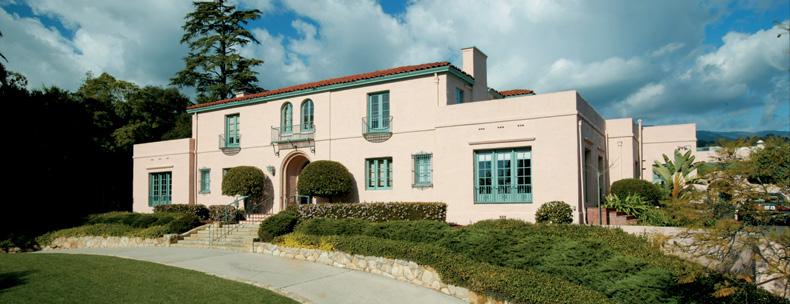

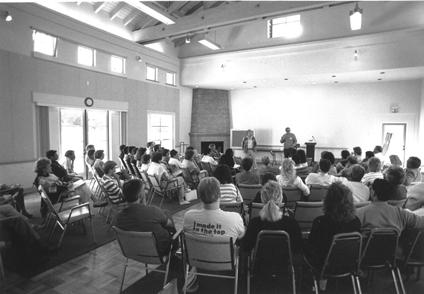
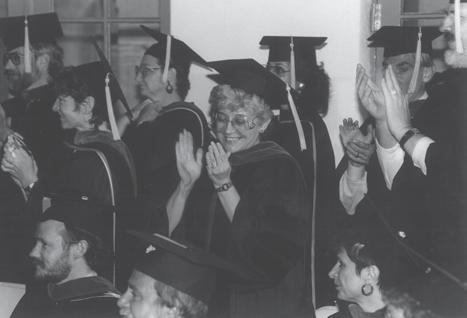
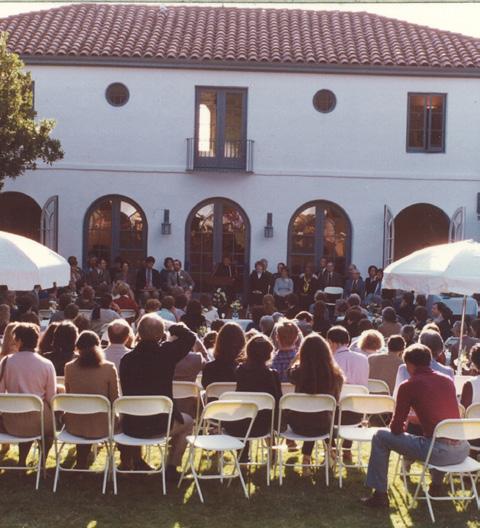
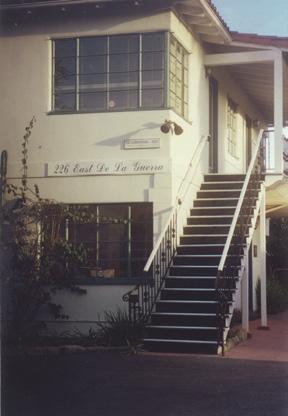
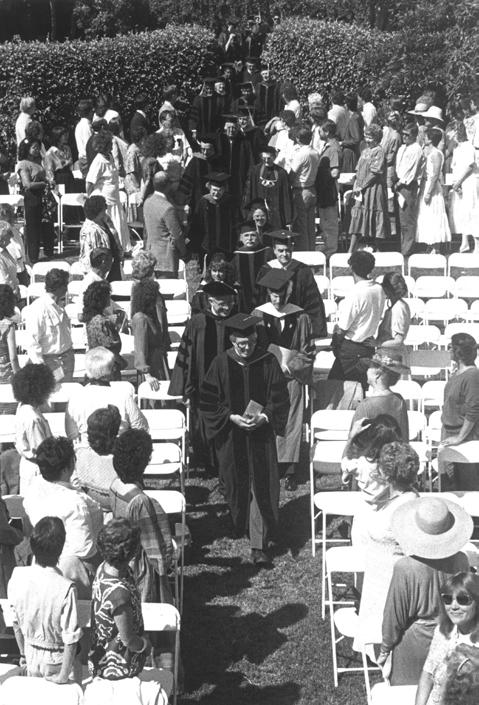
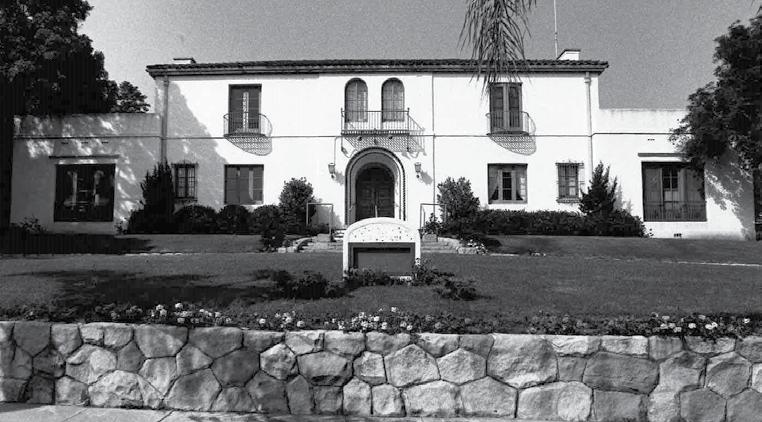

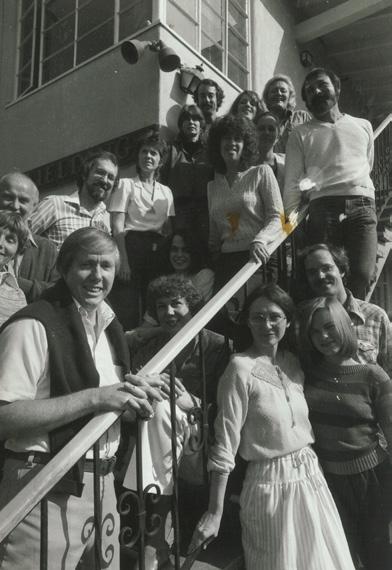
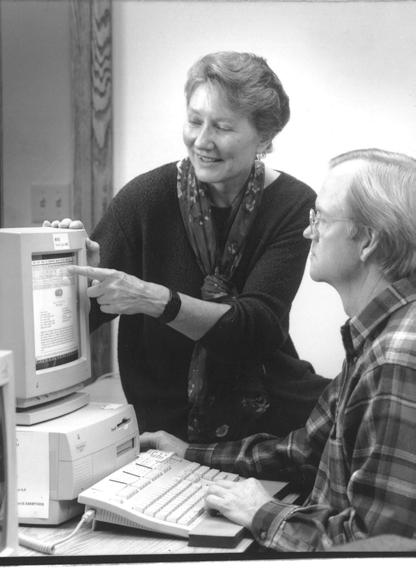

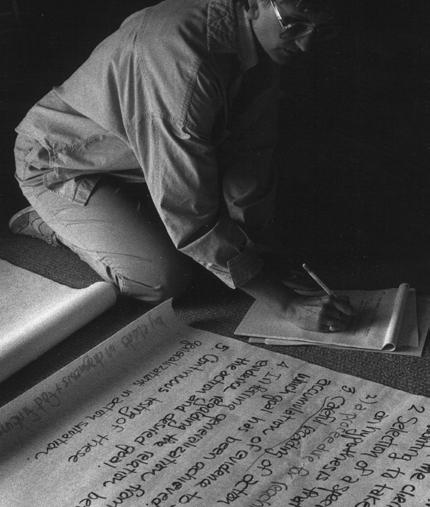
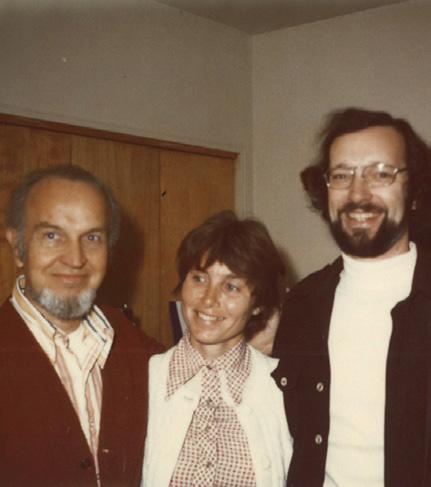
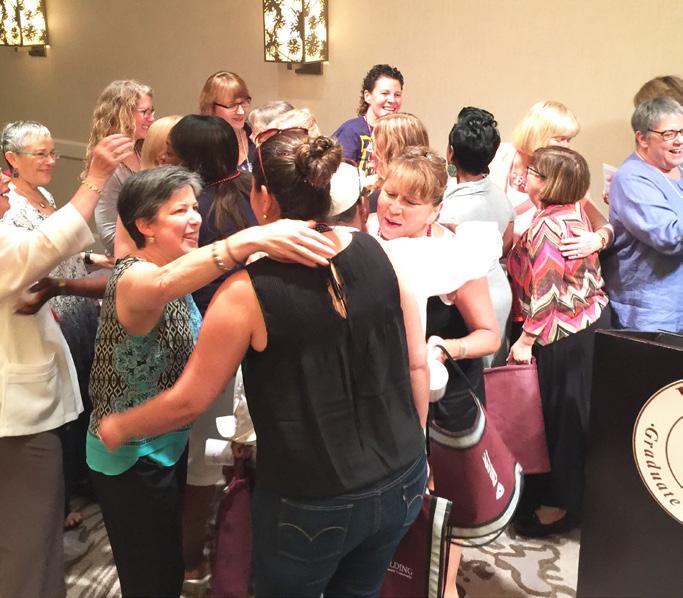
Leni Wildflower, PhD
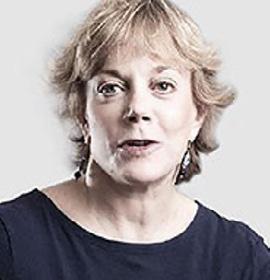
In 2005, I was teaching in Judy Stevens-Long’s and Dr. Matt Hamabata's innovative online master’s program, Organizational Management and Development. It was one of the first completely online Master's programs in the country. They had noticed that there was a growing interest in coaching, both in academic communities and in the corporate world. Judy asked me if I would be interested in designing a master’s level program in coach education and training.
Before studying for my PhD at Fielding, I had worked as a high school counselor and had long recognized the benefits, in this and other contexts, of talking through an issue with a supportive professional, but I was unfamiliar with coaching as a discipline. I began by working my way through a stack of books aimed at practitioners.
My research quickly led me to the International Coaching Federation. I consulted with Diane Brennan, who was then President of the ICF. It was clear to both of us that an academic coaching program, while training participants in coaching skills, should relate those skills to psychological theories, models of human development, and other traditions of knowledge that predated coaching as an identified activity.
We drew together an inspiring faculty and a wonderful cohort of participants, all eager for the adventure. And so, in the mid-2000s, with the enthusiastic support of Judy Stevens-Long, Fielding’s Evidence Based Coaching course was launched.
It seemed a good idea to gather the reading material we had created for the program, appropriately extended and developed, to create a textbook. Diane and I approached academics specializing in different areas, inviting them
to contribute chapters. Because we wanted to include traditions of wisdom, foundational to coaching, from beyond the academic sphere, we called the book The Handbook of Knowledge Based Coaching. I later wrote The Hidden History of Coaching. Most recently, Katrina Rogers and I wrote a chapter for a Fielding book on Transformational Coaching titled, Healing the Heart: Healing the Planet
EBC has lasted now for nearly two decades. Having passed through the capable hands of another several directors, it remains vibrant. I am thrilled at its strength and durability.
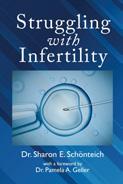


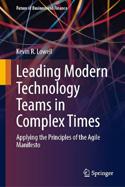
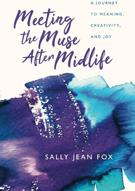
Sharon Schönteich, PhD (Clinical Psychology, ‘21) authored Struggling with Infertility (Fielding University Press, 2024).
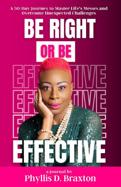
Carl R. Oliver, PhD (HOD, ’04) authored Clearing the Air in Los Angeles: The Fight Against Smog (The History Press, 2024).
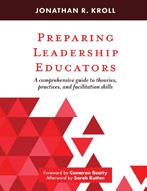
Lucinda J. Garthwaite, EdD (Education, ‘14) authored Bumbling Humans: Reflections on Liberatory Change (Onion River Press, 2023).

Kevin R. Lowell, PhD, (HOS, ‘20) authored Leading Modern Technology Teams in Complex Times: Applying the Principles of the Agile Manifesto (Springer, 2023).
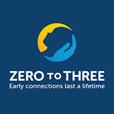
Sally Jean Fox (HOS, ‘94) authored Meeting the Muse After Midlife: A Journey to Meaning, Creativity and Joy (RWL Publishing, 2023).
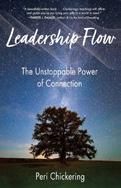
Phyllis D. Braxton (Leadership for Change, current student) authored Be Right or Be Effective: A 30-Day Journey to Master Life’s Messes and Overcome Unexpected Challenges (Independently Published, 2023).
Jonathan R. Kroll (HOS, ‘15) authored Preparing Leadership Educators: A Comprehensive Guide to Theories, Practices, and Facilitation Skills (Routledge, 2022).
Christina A. Reagle, EdD (Education, ‘07) authored Life at Fifth Below Zero: An Alaskan Memoir on Teaching and Learning (Wild Eagle, LLC, 2020).
Jeanette Luedders Jones, PhD (IECD alum), and Ira Glovinsky, PhD (IECD faculty) co-authored the journal article, Interoceptive Awareness in Early Childhood: Connecting Bodily Sensations to Emotions (ZERO TO THREE Journal, 2022).
Peri Chickering, PhD (HOS, ‘89), authored Leadership Flow: The Unstoppable Power of Connection (She Writes Press, 2021).

President Katrina S. Rogers, PhD, released a New Year Message on January 1, 2024. Read the message and watch the video at fielding.edu/news.
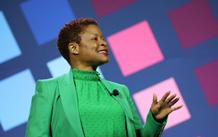
Provost and Senior Vice President of Fielding Graduate University, Wendi S. Williams, PhD, is running for the presidency of the American Psychological Association (APA). For 16 years, Dr. Williams has been involved with the APA and brings extensive experience in executive leadership and governance in academic and nonprofit organizational leadership throughout her career.
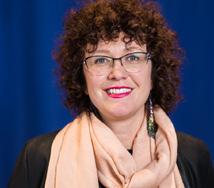
NEW VP OF UNIVERSITY RELATIONS ELENA NICKLASSON
Fielding Graduate University proudly introduces Elena I. Nicklasson, MA, as the newest member of its leadership team, taking on the role of Vice President of University Relations. In this pivotal year, marking the 50th Anniversary, Nicklasson’s appointment is integral to Fielding’s strategic initiative aimed at amplifying engagement and extending its impact both within the local community and on the global stage.
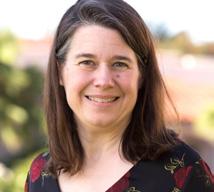
DR. KATHERINE MCGRAW
NAMED DIRECTOR OF MARIE FIELDER CENTER
Katherine McGraw, PhD, has been named Director of the Marie Fielder Center for Democracy, Leadership, and Social Justice. The Marie Fielder Center encourages research that addresses today’s educational and social problems. Dr. McGraw takes over the role after the passing of Dr. Orlando L. Taylor earlier this year. As a long-term mentee and colleague of Dr. Taylor, Dr. McGraw is honored to take on this role, in addition to her current role of Associate Provost of Research, Extramural Funding, and Faculty Development.
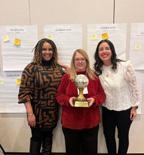
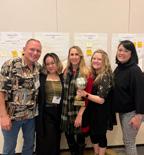
The 2024 Magic Feet Scholarship fundraiser raised $6,211 for Fielding's Clinical Pscyhology scholarship, surpassing the initial goal of $5,000 and setting a new record for the most funds raised in recent history. The San Diego ProSem earned the Magic Feet Award for the basket that raised the most funds. An honorary Maci Feet Award went to the San Francisco ProSem for raising and donating the most funds. The Seattle ProSem also received recognition for having the most creative auction basket.
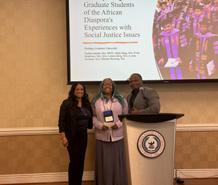
Fielding Graduate University's Clinical Psychology doctoral students Fran Boulware, MA, Maia King, MA, and Nathan Smith, MA, MSW, presented findings on "Graduate Students of the African Diaspora's Experiences with Social Justice Issues" at Virginia State University's 8th Annual Social Justice Conference. Supervised by faculty Susan Goldberg, JD, PhD, and Amy Taylor, PhD, their study delved into the experiences of five affinity groups and has been accepted at several upcoming conferences.
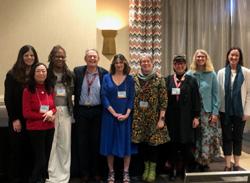
FACULTY ATTEND SFAA SOCIETY FOR APPLIED ANTHROPOLOGY ANNUAL CONFERENCE Faculty and students attended the SfAA Society for Applied Anthropology Annual Conference in Santa Fe, New Mexico, from March 26-29, 2024.

Lindsay Cahn, EdD, Director of Advising, earned the Fielding Director Professional Development Grant, totaling $1,000. Dr. Cahn used the funds to attend the WSCUC Accreditation Resource Conference in April 2024.

Faculty – Nina Newman, PhD
Reflective practice is how we wonder -- together and individually — about the feelings, thoughts, and behaviors of ourselves and others. It is the ability to understand that what we bring to our interactions can affect another person -- infant, child, adult — especially in terms of safety and trust, core to healthy relationships and growth. In IECD, this is foundational for our students, and for the infants, children, families, and practitioners with whom they work. Reflection is fundamental and is about developing a nonjudgmental understanding that the people with whom we engage are different than ourselves. We all have different nervous systems, strengths, areas for growth, histories, life experiences, and cultural backgrounds which combined shape our perceptions and how we make meaning in the world. Yet, we recognize we also have significant commonalities. As human beings, we are hard-wired to belong to each other. We are relational first and foremost. We need each other to survive and to thrive, especially in the face of change. IECD strives to elucidate how important this is as life is always changing, whether through development, personal growth, life events, trauma, or other circumstances beyond our control. We endeavor to support students and faculty to look inward and to feel and think outward, and to use reflective practice to broaden understanding and support inclusivity and equity in all our work. In doing so, IECD seeks to build the interconnective, relational network we need for the wellbeing of us all.

I started the IECD program in September 2020, never imagining the profound transformation it would bring to both my personal and professional life. My initial drive was a pure desire to learn more about infant-parent mental health and child development. As a medical social worker, it is incredibly important to understand how to not only intervene when there are challenges, but also how to be proactive to prevent or minimize challenges on the mezzo and macro level. This program was nothing short of amazing, expanding my knowledge base in ways that resonate with my values and beliefs about children and families. While it certainly challenged me, particularly in integrating theory and research, it ultimately revolutionized my approach. I can read research articles and apply both to practice and to advocate with evidence at the systemic level. The rigor of the program not only fostered learning but also encouraged me to reframe my thoughts and truly embody knowledge; moving beyond the knowing to really feeling what I know.
Hearing about experiences of colleagues pursuing doctorate degrees at other schools left me grateful for the cultural and life experiences my professors integrated into the curriculum and inclusive to their own inquiry of who I am and my lens as an AfricanAmerican woman.
For more than three decades in the, Clinical Psychology program, many faculty and students have prioritized diversity, equity, and inclusion in teaching, research, clinical practice, and beyond.
The Diversity, Equity, and Inclusion Committee has evolved from different names and focuses, with the current priority centered on issues of diversity in the student experience.
The DEI Committee is charged with ensuring that the admission materials support the selection of appropriate students, identifying impediments to students' success in the program, and recommending necessary supports. The committee retains Fielding’s core value of social justice by promoting engagement and dialogue around racial and social inequities to reach a more just and fair program and society.
The committee also developed and currently implements a 2022-2025 Action Plan with nine goals.
“It's easier to be influenced by our peers within our academic program and our environment for these opportunities and for training,” said Carmen Pulido, PhD, Clinical Psychology faculty and committee member. “It’s sometimes also easier for us as opposed to administration to have access to students’ points of view and get input from them regarding their needs. There's a unique place that allows for this work to be more easily implemented.”
The DEI Committee works collaboratively with the VP of DEI’s office and uses Fielding’s university-wide JEDI plan to achieve its goals. The committee offers DEI trainings, information sessions, programmatic research, and more student supports while ensuring that DEI is integrated into the Clinical Psychology curriculum.
“It’s important to have committees like this in academic programs because they promote inclusivity and prevent narrowmindedness within psychology,” said Muhammad Abubakar, current Clinical Psychology doctoral student and committee member. “We can see from our history that whenever there was a lack of diversity, it can sometimes lead to decisions or conclusions that really
don't have people's best interest in mind. The first DSM is an example of this, where there was a very niche population who wrote it. We have reached different conclusions today. We need a diverse set of people in academia because it does have real-life implications.”
DEI Committee members often reflect on their own learnings and experiences at Fielding and in other situations.
“I think that one thing that I've learned is that JEDI work is not subject to the vicissitudes of my energy levels or my emotions, that whether I get mad at microaggressions or whether I get tired of explaining things, the need is still great,” said Anthony “AGee” Greene, PhD, Clinical Psychology faculty, committee member, and Fielding Trustee. “The work must go on, so I've had to accept that. No matter how I feel about it, it still must be done.”
Lauren Mizock, PhD, Clinical Psychology faculty and committee member, echoes the continuation of DEIcentric work at Fielding and in higher education.
“The work must go on because it is never done,” Dr. Mizock said. “One of my mentors said, ‘Culture is a moving target.’ It's constantly evolving and changing. I think that's why there's been criticism of the term ‘cultural competence’ because there is this idea that we're going to reach a destination and achieve it and be okay, but it's really a more ongoing process of self-awareness, interpersonal skills, and dynamics. So many positive things have been happening at Fielding, but everything needs to keep getting worked on in our university and the world to see more consistent growth.”
Two alums have been awarded the prestigious Dianne Kipnes Social Innovation Award for their scholarship and practice. Wanda Whiteside, EdD (Leadership for Change, ‘23) and Kathy Bell, PhD (Human Development, ‘23) will advance their work in their respective fields in 2024-2026.
Dr. Whiteside is the founder and Artistic Producing Director of Live Garra Theatre in Montgomery County, Maryland. Through this award, she will partner with Montgomery College, Maryland’s Truth, Racial Healing & Transformation Campus Center to conduct an ongoing workshop series that incorporates “Playback Theatre,” an exercise that invites the audience to participate in the creation of improvised scenes focused on racial bias and issues of marginalization.
The project will assess the extent to which the activities increase participants’ positive social connection, wellbeing, sense of belonging, and understanding of underlying themes. Results will be disseminated through social media, conference presentations, and publications.
“The Dianne Kipnes Award for Social Innovation will allow me to expand my work as a theatre professional using Theatre for Social Change,” Dr. Whiteside said. “This esteemed award will enable me to enrich the public as a researcher-practitioner further. Through the community work of Live Garra Theatre, I will explore the impact the theatre arts have on people’s inherent biases, ultimately enabling them to recognize and overcome them. I will be able to further pursue my goals, utilizing as many resources as possible to engage citizens with their communities to facilitate social change. This award will allow me to have an even more profound effect on society and see it happen. I am genuinely grateful for this honor.”
Dr. Bell’s project, “Finding the Key to Positivity for Elders in Home Transition,” uses an arts-based methodology to explore how individuals in their late 70s and 80s can be supported in the process of downsizing their living spaces and possessions into a potential ideal future environment.
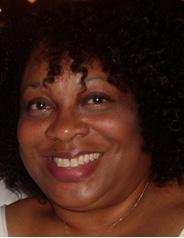
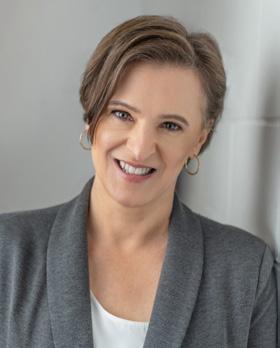
Related questions include how elders “idealize” their future homes, and the emotional support needed to help them create their ideal living environment. This further research is based on the work of Lindley and Wallace (2015) and will explore several aspects of home transition. The results will be used in a resource book for older adults that will be submitted for conference presentations and journal publication.
“This award allows me to continue my research with a traditionally under-researched group, elder women, and to learn more about how wise decisions are made during laterlife transitions,” said Dr. Bell. “At Fielding, I learned about Indigenous and arts-based methodologies that transformed my approach to research. I am especially grateful for the support and encouragement I received from Dr. Connie Corley and Dr. H.R. (Rick) Moody throughout my dissertation journey. Being part of the Creative Longevity and Wisdom doctoral concentration has truly changed my life.”
Charles McClintock, PhD, said both projects will continue to have an impact in the Fielding community and globally.
“These projects reflect the kind of innovation that results from Fielding’s educational model in which students are encouraged to explore issues of significance for their work and life experience,” said Dr. McClintock. “Through the Kipnes Fund support, Dr. Bell’s and Dr. Whiteside’s work will positively impact individuals and communities in the U.S. and beyond.”

Pam Rutledge, PhD, Faculty Emerita
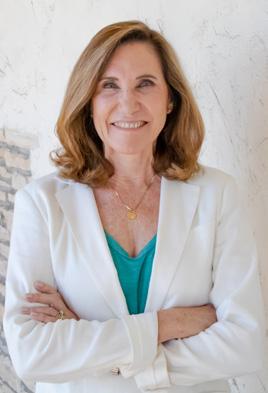
Media Psychology at Fielding is Unique
Media Psychology at Fielding was my professional and intellectual home for many years. A late entrant to the world of psychology, I came from a business and media design background. Fielding was my first really deep dive into psychological theory. Not only did I learn a lot, but it changed how I approached questions and looked for answers. At the applied level, it was humbling. It shifted my perspective from thinking of media as a “thing” to seeing it as an experience with all the complexities that view implies. There is a myriad of ways to conceptualize the ways people interact with media and technology. They consume, produce, and distribute, but never in a motivational vacuum. As social technologies have illustrated, media is a networked system, just like the human body. Media experiences are a product of interrelated systems. As Albert Bandura argued, environmental contexts, individual differences, and social pressures are always present to influence perception and behavior.
Fielding was the first to recognize the societal importance of psychology to this complex relationship inherent in our use of media and technology. In 2003, Fielding launched the Media Psychology doctoral degree program and housed it within a school of psychology rather than tucking it away as a subfield of another discipline. Fielding alumni and students have brought passion and entrepreneurial spirit to the program and the field. They have also been instrumental in expanding the definition of media psychology to be more inclusive of technology.












In the early days of the program, we Media Psychology students had long, late-night debates at sessions over how to define “media” beyond traditional broadcast media and print. However, the explosion of media applications, the widespread adoption of social media, and increased day-to-day reliance on technology solved that dilemma, making media psychology more vital and more diverse than ever before.







Media is no longer a discreet experience with content flowing across devices. Rather than be distracted by the “what” people are doing as each new technology appears, psychology remains our lens, keeping our focus humancentric. We look at the “why” behind media creation and consumption to understand the physiopsychological motivations that allow us to predict the potential impact on human behavior, cognition, emotion and, by extension, the implications for society.


















“Let Passion Be Your Guide” may sound like a line from a self-help book, but Fielding is unique in its flexibility. The emphasis on psychological foundations enables Fielding’s students to pursue their specific interests within a wide range of applications. Our alumni and students have gone on to develop a media literacy curriculum, analyze audience response to popular media narratives, demonstrate a sense of community in virtual experiences, and develop positive technology design. I have had students design marketing campaigns, create new businesses, develop podcast series, identify user experience log jams that interfere with technology adoption, build personas for television programming, explore the persuasiveness of A.I. chatbots as storytellers, examine news bias, and expose the ethical issues inherent in algorithms built on historical data. I was fortunate to work with advertising agencies and entertainment companies to help them understand audience responses to content. As far-ranging as that list sounds, all the questions share common roots in psychology.
























Media Psychology is Essential
Media plays an increasingly meaningful part in our lives. It’s been 30-plus years since the Internet disrupted the status quo by creating peer-to-peer connectivity. Many had high hopes that a globally networked world would bring the democratization of information, a reduction in conflict and prejudice, innovation and economic growth, empowerment through self-expression and creativity, and more diverse voices. The Internet may not have met such utopian expectations, but it has provided many benefits. Digital connectivity has increased social connections by eliminating distance; providing immediate and inexpensive access to people and information; empowered many activities that increase opportunity and well-being, such as education, social interactions, and facilitated creative expression. However, networked technologies have also presented unforeseen and far-ranging negative consequences, such as privacy violations, mis- and disinformation, the lack of equitable access, filter bubbles, less civility, and more outrage fueling divisiveness with disastrous social costs. Change is hard, especially the rapid change ushered in by the Internet. Throughout history, people have tended to view new technologies and the behaviors they inspire with suspicion and fear. It’s easy to point fingers at the problems and overlook the contributions.
In 1948, Abe Jaffe argued that change from technology was inevitable and that the only way to meet the challenges of technological change was to study technology. With a bias toward positive psychology, I would argue that the study of media and technology is not only necessary to meet the challenges but also to identify and leverage the positives.
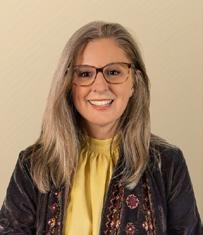
Scholarship Name: Valerie Bentz Endowed Scholarship for Mindful Inquiry and Transformative Phenomenology
Dissertation Focus: The Impact of Diagnostic Communication on One’s Lived Experience: Border Negotiations of the Self: Phenomenological Insights into Reflective Intelligence, Identity, and the 'I' vs. 'Me' Duality in Adults with ADHD.
Our lives are impacted by how we construct our social realities. My proposed future study looks to use the traditions associated with mindful inquiry to explore and understand the lived experience of adults diagnosed with attention deficit hyperactivity disorder (ADHD). Using written narratives and interviews, I explore shared experience-based themes (Bentz, 1989; Peoples, 2021) regarding how one senses the impact of diagnostic communication on one's life. Do diagnostically assigned attributes and expectations impact their sense of Self? I envision contributing to scholarly discussions by pursuing additional research associated with adults
navigating life with ADHD and other mental health diagnoses and the influence of diagnostic communication on a sense of belonging in the workplace. In my postdissertation career, I see myself thriving in roles that align with my personal and professional coaching expertise by supporting individuals to develop effective relationships with themselves and those around them through selfreflection. In the long run, my goal is to contribute to the community by working with individuals, human resource leaders, and fellow coaches in understanding a lived experience and somatic approach to mental health that goes beyond the written description in the Diagnostic and Statistical Manual of Mental Disorders. I see myself actively engaging with professional communities and organizations focused on phenomenology, somatics, coaching, and mental health.
I am writing to express my deepest gratitude for the incredible opportunity you have provided me through the Valerie Bentz Endowed Scholarship for Mindful Inquiry and Transformative Phenomenology. Your generosity has lightened the financial responsibility of pursuing my education and ignited a spark of inspiration and motivation within me. Receiving this scholarship means more to me than words can adequately convey.
WE ARE GRATEFUL FOR YOUR SUPPORT OF OUR STUDENTS, ALUMS, AND THE UNIVERSITY AS A WHOLE.
The following list reflects all contributions, and pledges received from October 23, 2023 through April 18, 2024. Contact giving@fielding.edu with questions, corrections, or feedback.
Dorothy & Niels Agger-Gupta
Pauline Albert
Janet Baldwin Anderson
Richard Appelbaum & Karen Shapiro
Patricia Arredondo
Axis Chiropractic
Susan & John R. Bahr
Nancy Baker & Cathy Hauer
Michael Becker
Anne Hatcher Berenberg
Philip Bergey
Shauna Betof
Schehereade and Donald Black
Karen S. Bogart & Zac Smith
Judy & David Bordin
Alma Boutin-Martinez & Paul Boutin
Judith Boykin-Mccarthy
Yosef Bronsteyn
Joyce Burland
Tony Byers
Barbara Carnes
Robin Cash
David Cicerchi
Wayne Clark
Judith Clyman
Kayla Conrad
Jenene Craig
Glorious Crowder
James Day & Darra Prather-Day
John Dedrick
Alison Denton
Uma P. Dorn
Timothy J. Duggan & Andrea
McKenna
Jeannie Duncan
Keith Earley
David Edelman
Fariba Enteshari
April Fallon & Rama Rao Gogineni
Dino Ferrare
Arline Fireman
Linda Ford & Gary Bunevick
Milton Fuentes
Richard Gale
Greta Smith Garcia
Jeanne & Edward Gavrin
Kathy D. Geller
Tracy C. Gibbons
Shawn Givhan
Donna & Russell Goodman
Mark Gould
Anthony F. Greene
Carlos Grijalva
Lisa Hall
Marc Hanlan
Mary Hanzel
April Harris-Britt
Sherry & Robert Hatcher
Raymond Hawkins
Monica Hilding
Loretta Hobbs
Linda Honold
John Hoover
Michelle & Jay Horowitz
Michael Hudson
William Huffaker & Darin Severns
Linda & William Husson
Kae & Phil Hutchison
Jenny L. Johnson-Riley
The Kaleel Jamison Consulting Group, Inc.
Marsha Kalina
Judith Katz & David B. Levine
J Gwen Kennedy
June Klein
Mila Kon
Zieva & Marc Konvisser
Diana Kunkel & Trish Cleary
Lois LaShell & Alan Guskin
Susan & Robert Lawley
James Lazarus
Tomás Leal & José Cox
Cherjanét Lenzy
Tony LeTrent-Jones & Alfred E. Jones
Shifu Li
Linda A. Liang
Kathleen Long
Tracy N. Long
Julie Lopp
Sandra Lucas
Katherine E. Welch Lui & John W. Lui
Hilary Lyn
Heather MacDonald
Sarah N. MacDougall
Heather Mahardy
Sherry Maklary
Elizabeth Mangini
Barbara A. Mather
Robert Mathieu
Elizabeth Matory
Mary Maxwell
Naomi May
Charles McClintock & Carol Wilburn
Constance McEvoy
Belinda McFeeters
Katherine McGraw
Martha & Patrick McGraw
Keith Melville
Weston Milliken
Robert Mintz & Susan Ashinoff
Montecito Bank & Trust
Donald Mroz & Susan Lapine
Arnella Myers
Lynn & Andrew Newman
Mary & Eugene Nicholas
Elena I. Nicklasson
Dianne & Carl Oliver
Konjit Page
Beverly Palley
Marilyn Parker & Leonard Brooks
Wayne Patterson
Kay Payne
Sally Peterson* & Michael V. Carlisle
Marilyn Price-Mitchell
Henry Provost
Michael Radis
Sue Reamer
Rebecca Reese
Maria & Winfried Ritter
Leesa M. Riviere
Katrina S. Rogers
Juliet Rohde-Brown & James Paul
Brown
Marcia & Stephen Ruben
Barry Rubin
Jennifer Ruff
John R. Ruffin
Ruth Rymer
Maria Viola Sánchez & Chauncey
Franklin
Lori Schneider
Judith Schoenholtz Read
Pearl Seidman
Nancie Senet
Dale Severance
Constance & Jay Shafran
Martha Sherman
Ronna & Tom Sherman
Judith Silverstein
Lillian & Carl Simmons
Juliann Smendzuik-O'Brien
Nicola Smith
Monique Snowden & Cherise R. Hammie, CPA
Marie T. Sonnet & Robert Berklich
Reid Spearman
Theodora & Anthony Spina
Sherry & Tim Stanton
Kaylin R. Staten
AJ Steinberg
Joseph Steiner
Judy Stevens-Long & Larry Severance
Sonja Sullivan
Anna Szabados
Ted Takamura & Raynette Yoshida
Tolman & Wiker Insurance, Inc.
Sue Treppenhauer
Lynne Valek
Connie Veazey
Joan Vitello-Cicciu
Gary Wagenheim
Jessica Ward
Candace White
Wendi Williams
Skyler Worley
Patricia Zell & Michael Cox
In Honor of All ISI Fellows
Anna DiStefano, EdD
Sue Gordon, PhD
Fielding's 50th Anniversary
Lee Mahon, EdD
The Wonderful Fielding Community!
In Memory of
Charlie Seashore & Penguins 20th
Don D. Bushnell, PhD
Dori Pelz-Sherman, PhD
Marie Fielder, PhD
Orlando L. Taylor, PhD
Elaine Kepner, PhD
Bequests & Other Planned Gifts
We thank those who have generously designated Fielding in their wills or have made a planned gift to ensure Fielding’s future.
Anonymous
Pauline Albert
Natalie Ammarell
Peggy Azad
Nancy Lynn Baker
John L. Bennett
Valerie Bentz
Dorothy Billington*
Linda & Marvin Branch
Lynn Bursten
Don D. Bushnell*
Christine Clark
Kelly Clark
Anna DiStefano
D'Ann Downey
Nanine Ewing*
Melody Fortenberry
Jeff Frakes
Leola Furman
Kathy D. Geller
Tracy C. Gibbons
John H. Gladfelter*
Michael Goldstein
Sharon Hawley-Crum
Linda Honold
Roberta Jensen
Anne Kratz
Diana Kunkel & Trish
Cleary
Sarah N. MacDougall
Founders Circle Membership Benefits:
• Free Fielding publication annually
• Updates directly from the University Leadership Team
• Invitations to special events at the university
• Recognition opportunities
The Flexibility Of A Planned Gift:
• You are free to alter your plans at any time.
Paige & Don Marrs
Barbara A. Mather
Charles McClintock & Carol Wilburn
Sara Miller McCune
Pamela S. Meyer
Eileen Morgan
Donald Mroz & Susan
Lapine
Christi Olson
Wendy Overend
Marilyn Price-Mitchell
Kathleen Randolph
Katrina S. Rogers
Rochelle Santopoalo
Gerald J. Cicciu
Lee Mahon, EdD
Patricia Hodges, PhD
William (Bill) Cherry, PhD
Nancy & Paul Shaw
Andrea L. Shields
Judith Silverstein
James Skibo*
Nicola Smith
Carol Sommerfield
Ted J. Takamura
Roland* & Charlotte Troike
Pamela Van Dyke
Marjorie J. Woo
Patricia Zell
*Deceased

• You can structure your gift in different ways: a specific amount of money, piece of property, or percentage of your estate.
• You retain control over your assets should you need them during your lifetime.
CONTACT ELENA NICKLASSON, DIRECTOR OF DEVELOPMENT, ABOUT HOW YOU CAN MAKE AN IMPACT AT FIELDING THROUGH A PLANNED GIFT: 805.898.2926 OR GIVING@FIELDING.EDU.
DOCTORAL DEGREES
EdD, Leadership for Change
PhD, Human Development
PhD, Organizational Development & Change
Concentrations
Coaching
Community College Leadership for Change
Creative Longevity & Wisdom
Dual Language
Inclusive Leadership for Social Justice
Leadership of Higher Education Systems
Media, Technology, & Innovation
Organizational Development
Somatics, Phenomenology, & Communicative Leadership
Sustainability Leadership
MASTER’S DEGREE
MA, Organization Development & Leadership
CERTIFICATE
Evidence Based Coaching
DOCTORAL DEGREES
PhD, Clinical Psychology
Concentrations
Forensic Psychology
Health Psychology
Neuropsychology
Social Justice & Diversity
PhD, Infant and Early Childhood Development
Concentrations
Developmental, Individual Differences, Relationships (DIR®) Reflective Practice & Supervision
PhD, Media & Technology
Concentrations
Positive Psychology & Media Psychology & Audience
Engagement
Social Media Research
PhD Psychology
MASTER’S DEGREE
MA, Applied Media Psychology
MA, Infant, Child, & Family
Mental Health & Development
CERTIFICATES
Clinical Psychology, Postbaccalaureate
Media Psychology (with optional emphases in Media Neuroscience or Brand Psychology & Audience Engagement)
Neuropsychology Specialization Training Program
Respecialization in Clinical Psychology, Postdoctoral
The Institute for Social Innovation helps individuals, nonprofits, businesses, and government organizations create effective, efficient, sustainable, and just solutions to social problems via research, leadership, and organizational development.
The Marie Fielder Center for Democracy, Leadership, and Education is a multidisciplinary research and advocacy center aimed at advancing diversity and inclusion throughout society.
The Alonso Center for Psychodynamic Studies aims to expand the application of psychodynamic ideas, treatments, and principles both within the Fielding community and the larger society.
1, 2023 - MAY 14, 2024
Certificate in Evidence Based Coaching
Keena Aldrich Alexander-Lagard
Laura Andrews
Cache Barnes
Robert W. Bryan
Mia Chaidez
Leslie Clarke
Tiffani Stiavelli Collier
Samantha Stormy Amanda Colson
Farrar Frazee
Mike J. Haverty
William H. Light
William James Mains
Charles Mansour
Lisa Newkirk
Rexford Nickerson
Brenda Ann Petersen
Tanya Gomez Reifarth
Carmen Luz Rodriguez
Henry Sobanet
Master of Arts in Human Development
Tara Leigh Jebens-Singh
Tracy L. Lefebvre
Amanda Marie Leftwich
Rachael Lesslie
Mary Magdalen Khalil Matambanadzo
Lalique Renée Metz
Erica Montemayor
Terryann Nash
Master of Arts in Organization Development and Leadership
Nicholas David Andrews
Ginette Osier Bedsaul
Michael Cardus
Ellen B. Cohen
Alexxis Cook-Graham
Vera Andreyevna Fishman
Wayne Hewitt
Tiffany Lisa John
Signe Jordet
Mary Elizabeth Laye
Julia Fong Ma
Dragan Mitric
Emanuela Ponder
Michelle Lea Temple
Master of Arts in Organizational Development and Change
Michael Brogden
Alison Christensen
Lisa Kim
Rachel Elizabeth King
Mikyo McLellan
Randi Mott
Meaghan Nelson Onofrey
Krista Marie Pederson
Maria Sinanis
Master of Education
Maram Kamal Alaiwat
Marjester Donna Bailey
Wanda Cooke
Alaya Advaita Dannu
Paul Freedman
Adele Lawson Gardner
Rosa Ravencrow Juarez
Jamillah A. Richmond
Akilah Rosado
Lawrence Sam
Randy West
Certificate in Clinical Psychology
Eeman Abuasi
Angelika Aquino
Angela Arnburg
Zainab Bannout
Justin S. DeLew
Tiffany Beckman Dvorak
Henrietta Ifeoma Egbunike
Sarah Jacqueline Gibbons
Aditi Gupta
Charity Christine Harvey
Jessica Nicole Homeier
Krystal Anna Jackson
Britny Kenneh
Taylor Langston
Tanoyia Ines Lone
Jessica Nicole Montgomery
Susana Jessica Perez
Janelle Peters
Jennifer Suzanne Phillips
Kassandra Picado
Emma Rakichevich
Sahil Kainaat Thandi
Catherine Marie Ugalde
Talisia Williams
Certificate in Media Psychology
Krista Marie Wyatt
Certificate in Media Psychology with an emphasis in Media
Neuroscience
Aydan Kuhnert
Certificate in Neuropsychology Specialization
Laura Koppang
Jeanette Marie Basirico Lohr
Master of Arts in Applied Media Psychology
Andrea Harrison
Francis Segbedzi Pongo
Jeanine Lara Riedl
Blake Ryan Schaefer
Justin Paul Thomas
Master of Arts in Infant & Early Childhood Development with an emphasis in Mental Health & Developmental Disorders
Maya Nicolette Edinburgh-Taylor
Tracey Estriplet
Zaneta Javonmae Evans
Mary Katherine Gannon
Sarah Suzelle Hare
Michelle Carrillo Harris
Shu-Chun Lee
Carin Michelle Leiva
Dianna Manz
Kaitlyn J. Opar
Tracy Radford
Master of Arts in Psychology
Michael L. Cox
Alexander Jason Dontre
Patricia Louise Douglas
Zion David Hall
Teresa Q. Harris
Isabel Kenner
Jennifer Malloy
Sakina H. Spears
Master of Arts in Psychology with an emphasis in Clinical Psychology
Laura Carr
Anthony Quinton Jones
Cynthia Jan Kinn
Caroline Miller
Tieranni Parquet
Courtnie Larann Parsons
Leslie Poston
Andrew Benjamin Sears
Suchika Siotia
Karin Michelle Trinkler
Kelly Jean Walk
Damon Eugene Watkins, Jr.
Teshaundria Weston
NOVEMBER 1, 2023 - MAY 14, 2024
DOCTOR OF EDUCATION
Jeanne A. McCrea
Teachers' Perceptions of Cell Phone Use in the Secondary Classroom: Benefits and Barriers
DOCTOR OF EDUCATION WITH AN EMPHASIS IN LEADERSHIP FOR CHANGE
Acinta Monteverde
An Afterschool Program/Curriculum to Teach Parents and Children Critical Coping Skills for Our Times
Gina M. Ottinger
Principals Who Are Positively Impacting Teacher Retention on Behalf of Alaska Native Youth: A Study of Selected Rural Alaska Principals
Michael Rothman
Accountability and Students Who Reclaim Success: A Case Study of an Alternative High School
Jamie Rebecca Smith
The Impact of Community College Anti-Racist Learning Communities on Instructional Pedagogy and Interactions
Kinsley Imrie Titchener
The Relationship Between How Teachers Show Empathy and Job Burnout
Shayla R. Williams-Pryor Barriers to African American Women in Higher Education Leadership in Arkansas
Karen Min Zong
Midlife Transition and Well-Being in the Second Half: Experiences and Choices of Midlife Chinese Post Corona Virus Disease
DOCTOR OF PHILOSOPHY IN HUMAN & ORGANIZATIONAL SYSTEMS
Dawne Colleen Bringeland Who Goes To Post-Secondary Education, Who Does Not, and Why Not? What Are the Current Barriers to Accessing Post-Secondary Education?
Christopher Adam Szpryngel Dementia in and Beyond the Workplace: Lived Experiences of Employees With Early-Onset Dementia
Joel González Toro
Biorisk Management Systems Implementation to Minimize Occupational Exposure of Infectious Diseases in Molecular Bioengineering Research
DOCTOR OF PHILOSOPHY IN HUMAN DEVELOPMENT
Kathryn Jane Bell Wisdom Through the Eyes of Elder Women
Maha Saad Elnashar Teachers' Assessment and Perceptions of the Social and Emotional Competencies of Qatar Primary School Students: An Explanatory Sequential Mixed Methods Study
Charlene Feathers
Black Women Gotta Go Through So Much: A Narrative Inquiry Study About How Black Women Cope When Experiencing Gendered Racism at Work
Stacey L. Henline
The Influence of Emotional Transformation Therapy (ETT) on Reduction of Symptomatology From Untreated Childhood Trauma and Multiple Maladaptive Disorders
Zosia Zaks
Autistic Professionals Leading Paradigm Change: Moving Support From Normalization to Affirmation
DOCTOR OF PHILOSOPHY IN ORGANIZATIONAL DEVELOPMENT & CHANGE
Michael P. Andrews
The Santiago Theory: Applications in a Social Context
Timothy James DeBolt
Examining Renewable Energy Resources and Exploratory Decarbonization
Scenarios Within a Socio-TechnoEconomic Framework for Saint Croix of the U.S. Virgin Islands
Nicholas Gomez
Self-Talk: A Means to Improved Workplace Self-Regulation of Behavior
Louis Anthony Marucci
The Quest for Joy: Pathways to (Re) discover Joy After Experiences of Intense Suffering
Tao Song
Digital Transformation Experience for Go-Digital Small and Medium-Sized Enterprises: Some Possible Implications for China
DOCTOR OF PHILOSOPHY IN INFANT & EARLY CHILDHOOD DEVELOPMENT WITH AN EMPHASIS IN MENTAL HEALTH & DEVELOPMENTAL DISORDERS
Cheri Lynn Reaves
Preschool Teacher Attachment Styles: Implications for Bidirectional SocialEmotional Learning and Mediating Racial Bias
Sara Marie Weinkauf
Preventing the Need for Private Advocacy in the Special Education System: Associations Between Parent Perspectives and Pursuit of Private Advocates
DOCTOR OF PHILOSOPHY IN PSYCHOLOGY WITH AN EMPHASIS IN CLINICAL PSYCHOLOGY
Leonora P. Cabrera
Making Meaning Post Forced Repatriation: A Study of Deported Mexican American Young Adults Living in Mexico Post-Deportation From the United States
Elizeth J. Chavez
A Cross-Cultural View of Helicopter Parenting: The Moderation of SelfEfficacy and Academic Achievement by Familismo and Respeto
Courtney L. Crooks
The Phenomenology of Coercive Control: A Comparative Case Analysis of Lived Experience Surviving Domestic Abuse
Price D. Cusolito
Coping With Kidney Disease: The Role of Age, Stage of Disease, Years of Education, and Endorsed Gender Stereotypes in Predicting Depression, Anxiety, and Coping Behavior
Dylan D. Dimock
Influence of Worldview Sets on Emotional Distress
Agata Karolina Krala
Attitudes Towards Malingering Mental Health Illness To Exit the Military
Alexander Augustus Minter Minimalist Lifestyle: A Modifier of Meaning and Mental Health
Jeremy J. Musick
Influence of Relationship Styles of Clinical Supervision on Vicarious Trauma and Locus of Control in Mental Health Workers
Jennifer Peterson
Perceived Barriers To Exercise Behavior in Type II Diabetics Using the Theory of Planned Behavior and the Role of Personality
Wendy D. Siciliano
Working Memory Training Effects in Pediatric ADHD: A Meta-Analysis
Jonathan W. Smith
The Effects of Perceived Maternal Support for Children's Relationships With Their Father

